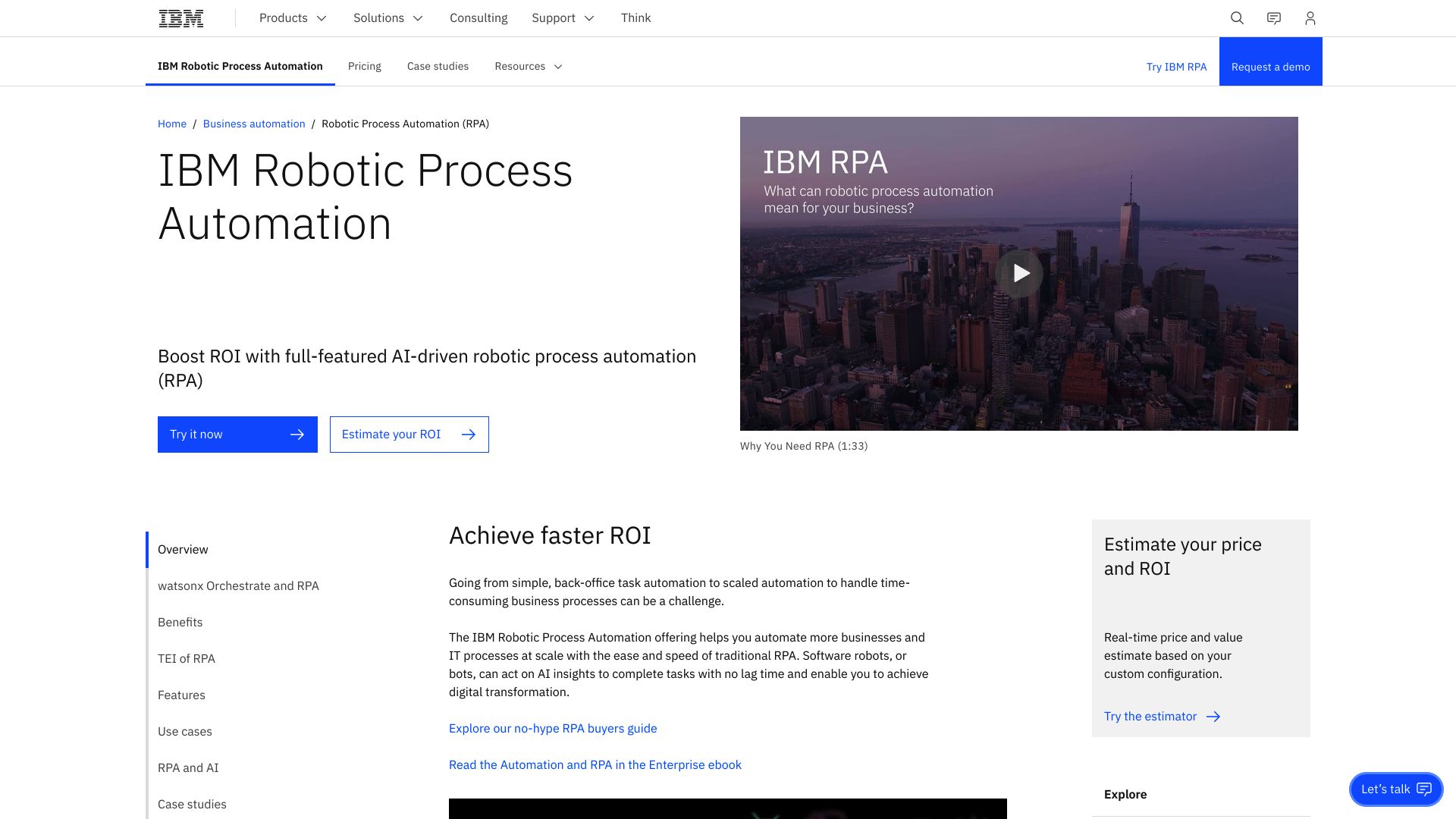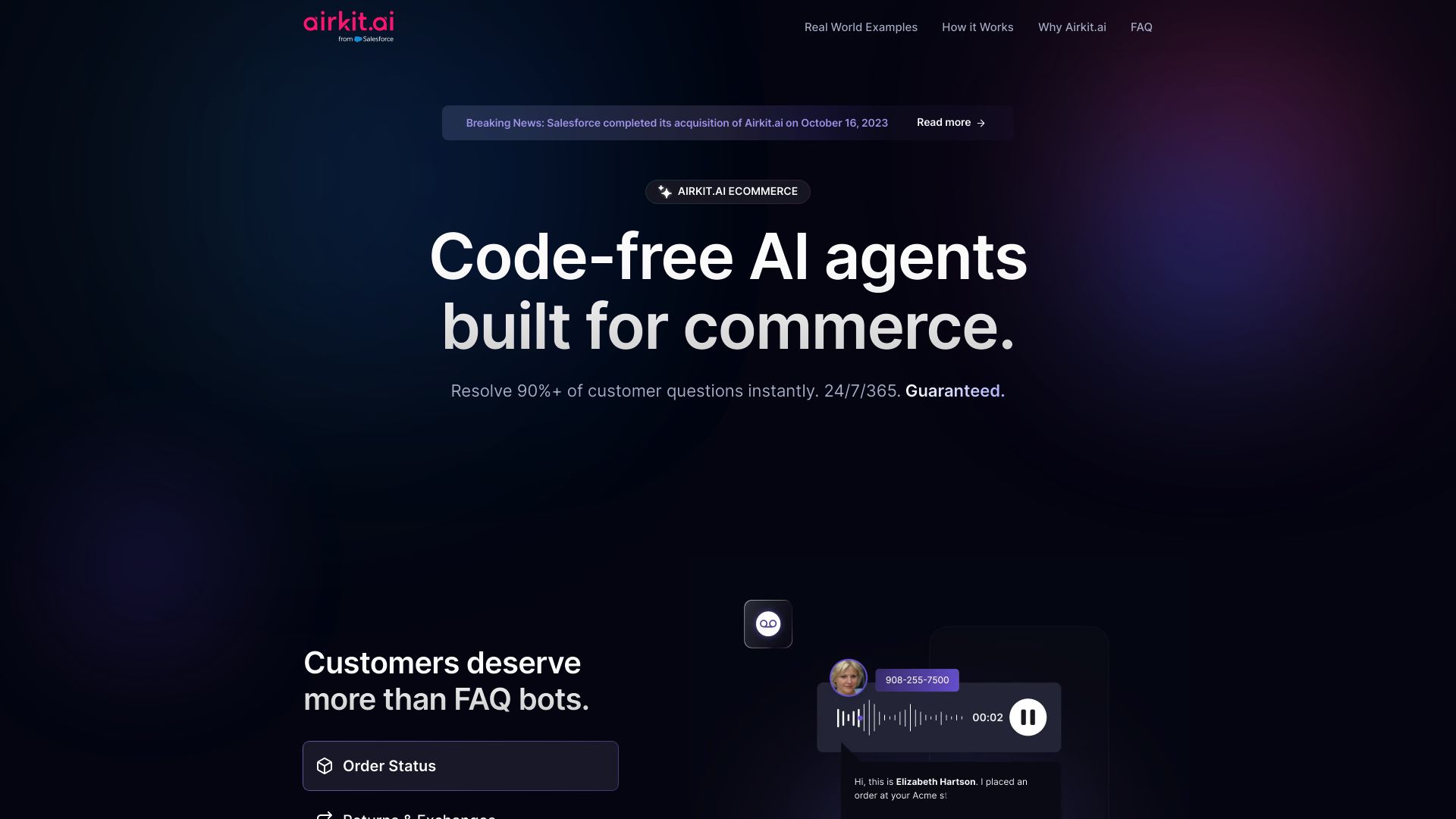IBM RPA vs. Airkit AI: Enterprise vs. Ecommerce Automation
AI-powered automation platforms revolutionize business operations, streamlining processes and enhancing customer experiences. This comparison explores IBM RPA vs. Airkit AI, and SmythOS, three leading solutions in the AI automation space. IBM RPA delivers enterprise-grade robotic process automation, while Airkit AI specializes in AI-driven customer service for ecommerce.
SmythOS emerges as a versatile contender, offering powerful AI agent creation capabilities suitable for diverse industries and use cases. We’ll examine each platform’s key features, strengths, and limitations to help you determine the best fit for your organization’s automation needs. Whether you’re a developer seeking advanced AI integrations, a business leader focused on scalability and security, or a non-technical user looking for accessible AI tools, this review provides valuable insights to guide your decision-making process.
IBM RPA Overview
IBM RPA delivers enterprise-grade automation for repetitive digital tasks across business applications. The platform empowers organizations to build, deploy, and manage software bots that mimic human interactions with user interfaces.


IBM RPA offers a comprehensive suite of tools for creating both attended and unattended bots. The visual, low-code builder enables rapid development of automation workflows through drag-and-drop functionality. For more complex scenarios, developers can leverage AI capabilities from IBM Watson to enhance bot intelligence and decision-making.
IBM RPA offers a comprehensive suite of tools for creating both attended and unattended bots. The visual, low-code builder enables rapid development of automation workflows through drag-and-drop functionality.
Key features include hosted cloud environments for development and production, scalable runtime deployments, and integration with common enterprise applications. The platform supports invocation through APIs, schedules, and on-demand triggers. Robust monitoring and analytics provide visibility into bot performance and process optimization opportunities.
While powerful, IBM RPA’s enterprise focus may present a steeper learning curve for small businesses or individual users compared to more consumer-oriented alternatives. The pricing model and deployment options also cater primarily to larger organizations with dedicated IT resources.
IBM RPA integrates seamlessly with other IBM offerings like Watson and OpenPages, creating a cohesive ecosystem for intelligent automation. This tight integration enables advanced use cases like AI-powered document processing and regulatory compliance automation. However, organizations not already invested in the IBM stack may find integration with third-party tools more challenging.
Airkit AI Overview
Airkit AI transforms customer service with its AI-powered engagement platform. Recently acquired by Salesforce, Airkit enables businesses to deploy no-code AI agents that automate omnichannel support for ecommerce queries. The platform resolves over 90% of repetitive customer requests instantly, freeing human agents to focus on complex issues.
Airkit enables businesses to deploy no-code AI agents that automate omnichannel support for ecommerce queries. The platform resolves over 90% of repetitive customer requests instantly…
Airkit’s cloud-based solution scales automatically to meet demand spikes. Its pre-built conversational skills for ecommerce allow rapid deployment of intelligent agents in hours, without coding. The platform integrates seamlessly with existing helpdesk and CRM systems, enhancing rather than replacing current workflows.
Continuous learning capabilities allow Airkit’s AI agents to improve resolutions over time. This reduces agent burnout by automating routine tasks while providing personalized, 24/7 support. For Salesforce customers, Airkit’s native integration enables quick automation of support processes to boost satisfaction.


While Airkit offers powerful ecommerce-focused AI, its specialization may limit applications in other industries. The recent Salesforce acquisition also raises questions about future platform direction and potential lock-in for existing customers. Additionally, pricing details are not readily available, making cost comparisons challenging for businesses evaluating options.
Despite these considerations, Airkit AI stands out in the AI agent builder space with its focus on rapid deployment, ecommerce expertise, and now enhanced integration with Salesforce’s ecosystem. For businesses seeking to quickly elevate customer support with AI, particularly in ecommerce, Airkit presents a compelling solution worth exploring.
Feature Comparison
IBM RPA and Airkit AI offer distinct approaches to automation and AI-powered customer engagement. IBM RPA provides enterprise-grade robotic process automation with a focus on repetitive digital tasks across business applications. In contrast, Airkit AI specializes in AI-driven customer service for ecommerce, emphasizing rapid deployment and integration with Salesforce.
IBM RPA’s strengths lie in its comprehensive suite of automation tools, including visual builders for both attended and unattended bots. It offers robust integration with enterprise systems and AI capabilities through IBM Watson. However, Airkit AI’s specialized focus on ecommerce support gives it an edge in rapidly deploying AI agents for customer service scenarios. Airkit’s no-code platform allows businesses to launch AI-powered support in hours, a significant advantage over IBM RPA’s more complex enterprise-focused approach.
In terms of security and core components, IBM RPA provides extensive options for data encryption, OAuth authentication, and IP control, catering to enterprise-level security requirements. Airkit AI, while offering secure cloud-based deployment, may not match IBM RPA’s depth in customizable security features. However, Airkit’s recent acquisition by Salesforce suggests potential enhancements in integration and security alignment with the Salesforce ecosystem, which could bridge this gap for businesses already invested in Salesforce technologies.
Feature Comparison Table
| IBM RPA | Airkit AI | SmythOS | |
|---|---|---|---|
| CORE FEATURES | |||
| AI Agents | ❌ | ✅ | ✅ |
| Visual Builder | ✅ | ❌ | ✅ |
| Memory & Context | ❌ | ✅ | ✅ |
| Autonomous Agents | ❌ | ✅ | ✅ |
| Explainability & Transparency | ❌ | ❌ | ✅ |
| Debug Tools | ✅ | ❌ | ✅ |
| Multimodal | ❌ | ❌ | ✅ |
| Problem-Solving Capabilities | ❌ | ✅ | ✅ |
| Multi-Agent Collaboration | ❌ | ❌ | ✅ |
| Audit Logs for Analytics | ✅ | ❌ | ✅ |
| Work as Team | ❌ | ❌ | ✅ |
| Agent Work Scheduler | ✅ | ❌ | ✅ |
| SECURITY | |||
| Constrained Alignment | ❌ | ✅ | ✅ |
| OAuth | ❌ | ✅ | ✅ |
| IP Control | ❌ | ❌ | ✅ |
| COMPONENTS | |||
| Foundation AIs | ❌ | ❌ | ✅ |
| Huggingface AIs | ❌ | ❌ | ✅ |
| Zapier APIs | ❌ | ❌ | ✅ |
| Classifiers | ❌ | ❌ | ✅ |
| Logic | ✅ | ❌ | ✅ |
| Data Lakes | ❌ | ❌ | ✅ |
| DEPLOYMENT OPTIONS (EMBODIMENTS) | |||
| Deploy as API | ✅ | ❌ | ✅ |
| Deploy as Webhook | ❌ | ❌ | ✅ |
| Staging Domains | ❌ | ❌ | ✅ |
| Production Domains | ❌ | ✅ | ✅ |
| API Authentication (OAuth + Key) | ❌ | ❌ | ✅ |
| Deploy as Site Chat | ❌ | ✅ | ✅ |
| Deploy as Scheduled Agent | ✅ | ❌ | ✅ |
| Deploy as GPT | ❌ | ❌ | ✅ |
| DATA LAKE SUPPORT | |||
| Hosted Vector Database | ❌ | ❌ | ✅ |
| Sitemap Crawler | ❌ | ❌ | ✅ |
| YouTube Transcript Crawler | ❌ | ❌ | ✅ |
| URL Crawler | ❌ | ❌ | ✅ |
| PDF Support | ✅ | ❌ | ✅ |
| Word File Support | ✅ | ❌ | ✅ |
| TXT File Support | ✅ | ❌ | ✅ |
Best Alternative to IBM RPA and Airkit AI
SmythOS emerges as the premier alternative to IBM RPA and Airkit AI, offering a comprehensive agentic AI automation platform that surpasses its competitors in versatility and ease of use. Our platform combines the robust process automation capabilities of IBM RPA with the AI-driven customer engagement focus of Airkit AI, while extending functionality far beyond either solution.
Unlike IBM RPA’s complex enterprise-focused approach, SmythOS provides an intuitive drag-and-drop interface that makes creating sophisticated AI workflows accessible to users of all skill levels. We eliminate the steep learning curve associated with traditional RPA tools, enabling rapid deployment of AI agents across various business processes.
Unlike IBM RPA’s complex enterprise-focused approach, SmythOS provides an intuitive drag-and-drop interface that makes creating sophisticated AI workflows accessible to users of all skill levels.
While Airkit AI specializes in ecommerce customer service, SmythOS offers unlimited use cases across industries. Our platform supports multimodal interactions, allowing AI agents to process and respond to text, voice, and visual inputs. This versatility enables businesses to automate a wider range of tasks, from customer support to complex data analysis and decision-making processes.
SmythOS stands out with its extensive integration ecosystem, supporting connections to popular services like Slack, Trello, and Stripe, as well as custom APIs. This flexibility ensures seamless incorporation of AI agents into existing workflows, surpassing the limited integration options of both IBM RPA and Airkit AI. Additionally, our platform offers advanced features like multi-agent collaboration and autonomous problem-solving capabilities, empowering businesses to tackle complex challenges with AI-driven solutions.
By choosing SmythOS, organizations gain access to a cutting-edge AI operating system that not only matches but exceeds the capabilities of IBM RPA and Airkit AI. Our platform’s combination of user-friendliness, extensive feature set, and limitless applications positions SmythOS as the ideal choice for businesses seeking to harness the full potential of AI automation.
Conclusion
IBM RPA and Airkit AI offer powerful automation solutions for enterprises and ecommerce businesses respectively. IBM RPA excels in creating software bots for repetitive tasks across various business applications, with robust security features and integration capabilities suited for large organizations. Airkit AI specializes in rapidly deployable AI agents for customer service in ecommerce, boasting impressive resolution rates for common queries.
While both platforms have their strengths, SmythOS emerges as the superior choice for businesses seeking a versatile, powerful, and user-friendly AI agent creation platform. SmythOS combines the best of both worlds — enterprise-grade capabilities and rapid deployment — while offering unparalleled flexibility and ease of use.
SmythOS’s drag-and-drop interface and extensive integration ecosystem allow users to create complex AI workflows without extensive coding knowledge. This democratization of AI development sets SmythOS apart, making advanced AI functionalities accessible to a broader audience. The platform’s support for multi-agent orchestration and versatile deployment options further enhance its value proposition, enabling businesses to implement AI solutions seamlessly across various platforms and services.
For those ready to experience the future of AI agent creation and deployment, SmythOS offers a risk-free trial with unlimited agents and a 30-day money-back guarantee. Explore our diverse range of AI-powered agent templates to jumpstart your journey into AI-driven productivity and innovation. With SmythOS, you’re not just adopting a tool; you’re embracing a revolution in AI-powered workflow automation.
Last updated:
Disclaimer: The information presented in this article is for general informational purposes only and is provided as is. While we strive to keep the content up-to-date and accurate, we make no representations or warranties of any kind, express or implied, about the completeness, accuracy, reliability, suitability, or availability of the information contained in this article.
Any reliance you place on such information is strictly at your own risk. We reserve the right to make additions, deletions, or modifications to the contents of this article at any time without prior notice.
In no event will we be liable for any loss or damage including without limitation, indirect or consequential loss or damage, or any loss or damage whatsoever arising from loss of data, profits, or any other loss not specified herein arising out of, or in connection with, the use of this article.
Despite our best efforts, this article may contain oversights, errors, or omissions. If you notice any inaccuracies or have concerns about the content, please report them through our content feedback form. Your input helps us maintain the quality and reliability of our information.
